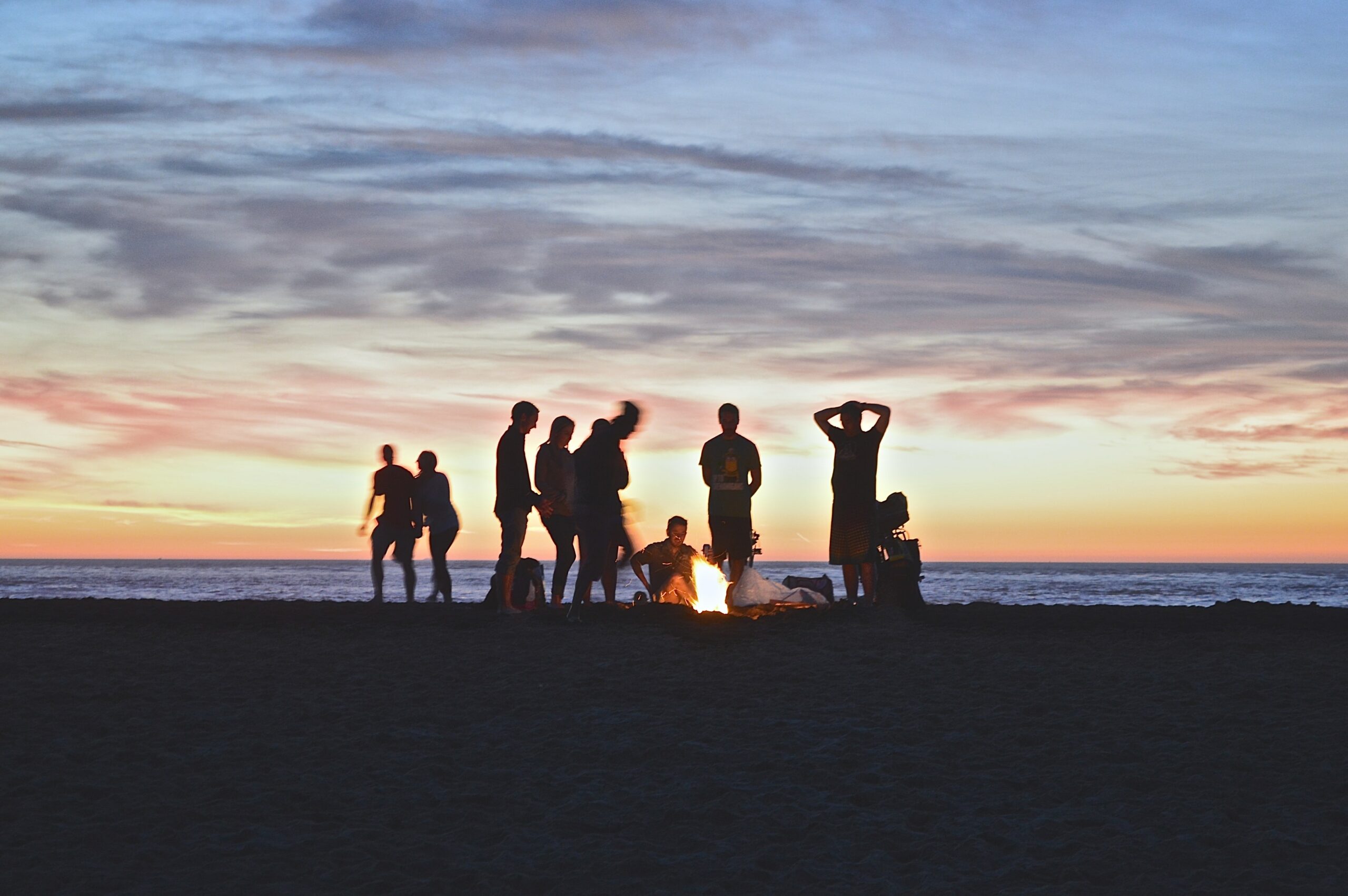An excerpt from Martin Aylward’s book “Awake Where You Are: The Art of Embodied Awareness” (2021) – shared with permission.
The Buddha talked about the Three Jewels of this practice being Buddha, Dharma, Sangha. Buddha means awakening—the gradual and sudden extraordinary awakening to the way things are. Dharma means the nature of things—and the teachings that support that practice. And then, Sangha is—oh, other people! As a European, I’ve grown up in an intensely individualistic culture, where we value space and privacy and personal autonomy—where all the focus is on the individual’s rights and freedoms. It is most explicitly enshrined by the delusional American Dream that you can be whatever you want to be—a neoliberal truism that ignores the systemic prejudice, marginalisation and oppression faced by some sections of the population).
Different cultures have different relationships to comm-unity (literally “as-one-ness”) with other human beings. Where U.S. and European culture emphasize individualistic identity, many other cultures are more collective—the primary identity established in relationship to belonging—a felt sense of identifying with the community more than the individual. My Indian friend Wakhil from Varanasi, was invited on a South Indian pilgrimage. His one condition for the journey was that he must not under any circumstances have to sleep alone. He told me, “I’ll go on that journey as long as they don’t give me a single room. My whole life, I’ve slept next to my brothers, uncles, and other family members. How miserable, lonely and frightening to sleep in a room on my own.” At Moulin de Chaves though, the meditation center in France where I live and teach, back in the realms of individuality, people will often only feel able to come on retreat if they can be sure of their own room. Sharing a room for some is a deal-breaker. “No single room? No retreat!”
Our individuality comes at a cost. While it fosters important qualities like confidence, agency, and independance, it also generates insecurity and alienation. I remember waiting in an empty train station waiting room, late at night in Delhi. After some time a man came in, and glancing around at all the empty seats, came straight over to sit right next to me. It was the obvious thing to do. In contrast, in European and American waiting rooms, people genrally sit as far away as possible from the next, dreaded human being. It is partly out of respect for the other individual (let’s keep that bit!), but partly too that our individualistic culture breeds a certain wariness, anxiety and distrust of other human beings. And that bit we need to grow out of.
We need community—each other, warm bodies. Studies are increasingly telling us how addiction, depression, and anxiety disorders are deeply related to a lack of connection, (as if we didn’t know). Living alone, some people go weeks without simple, physical skin contact with another human—without a hug.
The COVID-19 pandemic (which had not begun at the time of writing, but now as I edit has become the defining feature of current times) has shown us the danger of hyper-individualism. Loud voices of objection to masks, social distance and sheltering at home are often much more focused on my rights as an individual, than on our responsibility to take care of each other.
Yet contact can also feel threatening, or invasive. For some people, one of the attractions of silent retreat is you don’t have to talk to anybody! And some of us by nature are just more introvert. We just like being alone. Nevertheless, we live in a relational world, and one which is forcing us closer together. With the increasing risk of rising sea levels displacing populations, and as increasing temperature extremes compromise crowd yields and food availability, how will we manage if we gravitate toward conflict instead of collaboration, toward withdrawal instead of contact, toward individual greed instead of communal need?
Meditative experiences can take us into profound experiences of intimacy and belonging. Deep inter-being with the whole universe can be known in a breath or a sunset, but how easily that expansion shrinks back to self-conscious identification, when you open your eyes and see other human beings! Our practice invites us to see where we shrink–and why.
We have to build community, where we live and in how we live with each other. Perhaps the following reflexions, and others like them, will become life-saving practices during the next few decades of ecological upheaval and societal transformation:
- How can you be with others and stay embodied?
- How can you stay in relationship when you disagree with your lover, colleague or neighbor?
- How can you listen to the humanity of your family member, even when you disagree with their point of view?
- How can you contribute to the welfare and safety and ease of those around you?
- How can you strengthen bonds of care, empathy and mutual support?
We can recognize several basic tendencies, all based on fear, in our contact with other humans. They arise from a fear of being ignored, a fear of being rejected and a fear of being seen, and they correspond to the “ three poisons” in Buddhist psychology—demanding, defensive, and deluded, respectively. One maladaptive tendency demands contact, in the form of attention. Another defends against contact, which feels intrusive. And a third deludes themselves about contact and the nature or intentions of the other.
If we use the microscope of meditative attention to zoom in on these tendencies, you can see which style you most recognize from your own relational patterns:
A demanding relational style is where you lean out of yourself into the other, trying to be pleasing, or to impress, or with a lot of anxious anticipation about what the other might be thinking about you. You feel dependent on the other’s approval or appreciation, without which you feel inadequate or insecure. It can present as arrogance or as neediness, depending on what you are trying to get from or impress upon the other. Basically though, the neurotic is always checking: “Do you love me?”
The defending style is where you withdraw into yourself as a form of protection, an attempt to be self-reliant, independent and invulnerable. Others may seem complicated or threatening, unreliable, or untrustworthy, depending on your personality development and previous conditioning. This stance is: “I don’t need anyone”
“Deluded” relating is harder to pin down. You might flip from engagement to withdrawal, from being enamored of others to feeling betrayed by them. This personality feels easily slighted or misunderstood. Their mantra might be: “You don’t know me!”
What do you recognize from the three types above? Getting to know your own relating style is an important part of exploring it, and getting free of it. Do you tend to withdraw in, for example? If so, you can’t just switch that off, but you can stay curious—What am I withdrawing from? What might I be afraid of ? Do I need to withdraw quite this much? It’s not that the answer is definitely No. If you have a lifelong pattern of withdrawal, then pulling back from others might feel very safe and necessary. But what might happen if you soften a little? Come forward a little, inhabit your body and feelings, just a little?
Or, if the tendency is to go out, then you can also explore: What happens if I come back to myself ? What is happening in my body while I’m fixating on the other person? There is a certain irony in that we lean out of ourselves in an attempt to make contact, a quest for intimacy and connection—but actually the more we stay at home in ourselves, the more we are present for the actual experience of intimacy with another. Because ultimately, all intimacy happens here, in your embodied experience. As soon as you lean out to please or impress the other, you make the other, well, other. The more you stay at home in your felt experience, whether you’re agreeing with or arguing with someone, there’s an intimacy possible because, where is that other? Oh, they’re here. Here in awareness, here in the perception, the feeling, the contact. When you meet a so-called-nother in the actual recognition that the meeting is happening here, then you actually comm-une as one. This is the foundation of real community, and it’s available with anyone. Everyone. Always. Whether they are able to commune with you, or not.
Human beings are amazing, all of them. All of us. Deserving of our interest, deserving of our care, our solidarity, our understanding. Some actions are hard to understand. Some actions are impossible to be in solidarity with. But every heart feels the same basic experience as this heart—pain, confusion, struggle, joy. Every heart is longing for ease. Seeing this we see our human community. It’s not really even about my heart and your heart, my feelings or your feelings. We have human feelings, human life, a human body and heart and mind.
We’ve never been more aware as a species of how closely we live together, sharing the air and water and land of one planet. Pollution doesn’t respect national borders. Trees act as the lungs of the whole planet, no matter where their location And the COVID-19 situation has made all too clear how interconnected we inevitably are. Yet this awareness of our fundamental nonseparation is too much for some, and they withdraw unconsciously into xenophobic tribalism, with the blame, persecution and hatred that we see playing out so depressingly and dangerously in our politically and socially fractured world. For the sake of our human community and our deep solidarity with all of life, we all need to expand our view and our heart. And our opportunity is here, with the people around you, right now.

